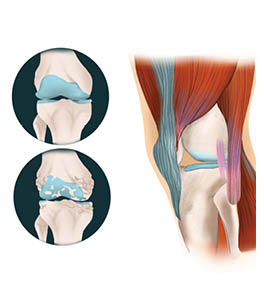
Hip Replacement Surgery
Hip replacement surgery replaces a damaged hip with a prosthesis to relieve pain and improve daily function when other treatments fail.
Our specialists work closely with you to determine the most comprehensive surgical options to get you up and moving again.
Our approach to hip replacement surgery
Initial screening
During your initial examination, your physicians will take X-rays of your hips, compare them to any previous imaging and conduct a full medical history and physical. They will ask about your mobility limitations and functionality and examine your gait and range of motion.
Treatment plan
Once our specialists diagnose your condition, they will work closely with you to develop a treatment plan.
Your physician will exhaust all non-surgical options, working with a multidisciplinary team that includes other orthopaedic physicians, physical therapists and sports medicine specialists. If you require surgery, you can be assured that it will be as quick and painless a procedure as possible.
Recovery
Within a week of your surgery, one of our nurse navigators will follow up with you to monitor your recovery. Typically, you'll have home health physical therapy for the first six weeks, often working with a nurse who will come to your home.
We also offer a medication pathway if you require a lot of medication post-surgery. It’s designed to reduce your risk of dependency by prescribing different medications that work synergistically.

Don’t let hip pain keep you from living your best life
Our hip replacement surgeons can get you up and moving again
Call 714-456-7012 to make an appointment with an hip care specialist, or
Reasons for hip replacement surgery
When a stiff, painful hip joint begins to interfere with your everyday life and nonsurgical treatments are no longer effective, hip replacement may be an option.
The following cases require hip replacement surgery:
- Avascular necrosis of the hip
- Bone cancer
- Broken hip
- Following a hip fracture
- Osteoarthritis
- Rheumatoid arthritis
- Traumatic arthritis, which is arthritis because of an injury
The goal of the surgery is to replace the parts of your hip joint that have been damaged. This relieves hip pain that cannot be controlled by other treatments.
What symptoms may lead to hip replacement?
Symptoms of hip pain that might lead you to consider having surgery include:
- Pain that is not helped by pain medication
- Pain that persists, even while using a cane or walker
- Pain interfering with sleep
- Difficulty climbing stair
- Difficulty standing up
- An inability to enjoy daily life because of pain
Benefits of hip replacement surgery
Between 80 and 90% of UCI Health hip surgery patients make a full recovery in three months. Around 60% recover by six weeks.
You can expect to be walking the same day as your surgery. Most patients return home the day after surgery, while 20% return home the same day.
When you are discharged, you can expect to be fairly independent in your movements.
What to expect from hip replacement surgery
When you schedule an appointment with our hip replacement surgeons, they will take your full medical history, focusing on your limitations and functionality. They’ll ask how long you’ve been experiencing hip problems and what, if any treatments you’ve tried so far.
They will conduct a detailed and focused physical exam, evaluating your gait and range of motion.
They will take an X-ray of your hip joint and, after comparing them with any previous imagery taken, they will work with you to formulate a treatment plan.
Preparing for surgery
Before surgery, your physician will explain the procedure and give you the opportunity to ask any questions you may have. You will be asked to sign a consent form that gives your physician permission to do the procedure. Be sure to read the consent form carefully and ask questions if anything is unclear.
After deciding to have surgery, we’ll obtain additional lab work. Depending on other medical issues, you may be asked to get medical clearance from your primary care physician or cardiologist.
The best time to prepare yourself and your home for recovery is before your procedure. Some things you may want to do include:
- Lose weight
- Make modifications at home
- Talk about medications with your doctor
- Arrange transportation
- Eat a light meal the night before the surgery
What happens after my hip replacement surgery?
After your surgery, you’ll go to the recovery room for observation. Once you're awake and your vital signs are stable, we’ll move you to your room.
Hospital stay
Most patients stay in the hospital for about two days. During this time, you may need to:
- Use a walker for support
- Be extra careful to avoid falls
- Take medicine to prevent blood clots
- Wear compression stockings
- Breathe deeply and cough 10-20 times per hour to prevent fluid buildup in your lungs
After surgery
It’s important to start moving your new joint soon after surgery. A physical therapist will help you create an exercise plan to follow in the hospital and at home.
Pain medication will help make it easier to participate in therapy and exercise. You’ll continue physical therapy until you regain muscle strength and a good range of motion in your new hip.
At home
When you return home, follow these tips to support your recovery:
- Keep your incision clean and dry.
- Ask your doctor when it’s safe to shower or bathe.
- Place a V-shaped pillow between your legs when seated to keep your hip in the correct position.
- Continue exercising to strengthen your muscles.
- Follow any restrictions to prevent dislocating your new joint.
- Only take medications your doctor recommends.
- Tell your dentist about your surgery, as you may need antibiotics for certain procedures to prevent infection.
- Maintain a healthy weight to avoid extra wear on your joint.
- Avoid high-impact activities like jogging; choose non-impact exercises like swimming or cycling instead.
- Follow all instructions from your doctor.
Most patients can return to normal activities within six weeks.
When to call your doctor
After leaving the hospital, contact your doctor if you experience:
- Fever chills or signs of infection
- Redness swelling increasing pain or unusual discharge around the incision
- Pain or swelling in your legs or feet
- Shortness of breath, coughing or chest pain
- Severe nausea or vomiting
- Worsening hip pain that isn’t controlled with medication
- Numbness or loss of feeling in your leg, knee or foot
- Pain, burning, or blood in your urine or trouble urinating
These steps will help ensure your recovery is smooth and safe.
What to look out for
Although post-operative hip dislocations are rare, your risk is highest in the months after your surgery, while your tissues are still healing. To minimize this risk, your therapy team will show you ways to move that can prevent dislocation.If your hip does become dislocated, there are both surgical and non-surgical options your doctor may undertake to treat you.
Why choose UCI Health for hip replacement surgery?
Unmatched expertise
The hip care surgeons at UCI Health are experts in treating every kind of hip condition, from degenerative diseases, to traumatic injuries, to sports injuries, to complications from surgery.
Highly skilled in the latest technologies
Our specialists use:
-
Computer assisted visualization methods that increase precision
-
Anterior surgical approaches that lead to faster recovery times, less restrictions and lower dislocation rates
-
Periacetabular osteotomy (PAO) for younger patients that involves reconstructive surgery. UCI Health is the only hospital in Orange County to offer PAO.
We’re Orange County’s only academic medical center
We conduct unique research; our physicians are involved in the latest studies and clinical trials. If you qualify, you may get access to new treatments and techniques not yet widely available.
Featured Blog Posts

Live Well’s most popular stories of 2023
Take a peek at our readers' favorite articles of the year.

Partial knee replacement revitalizes life of Marine

A novel approach to treating knee arthritis
A first-in-human clinical trial shows promise as a nonsurgical way to keep aging knees strong and pain-free.




